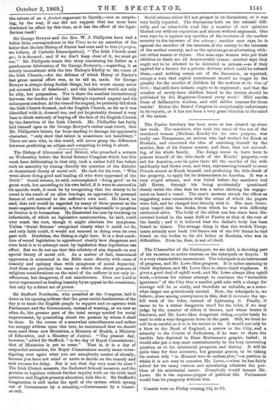Sir George Bowyer and the Rev. W. J. Phillpotta have
had a bitter little correspondence in the Times as to an assertion of the latter that the late Bishop of Exeter had once said to him (apropos, we believe, of Catholic Emancipation), "The Irish Church must ; it is doomed ; and if we don't keep clear of it, we must go too." Mr. Phillpotta treats this story concerning his father as a posthumous fabrication of Sir George Bowyer's,—regarding it as -utterly inconsistent with the late Bishop's fidelity to the cause of the Irish Church,—for the defence of which Henry of Exeter's Jest great mental effort was, as he tell us, made. Sir George _Bowyer is always doing foolish things, but his worst enemy never jet accused him of falsehood ; and this falsehood would not only be silly, but purposeless. Nor is there the smallest inconsistency between the burden of the late Bishop's reported augury and his subsequent conduct. At the timeof the augury, he probably did think the Irish Church doomed, and the English Church, so far as it was identified with it, doomed too, and yet he probably deemed it very base to think seriously of buying off the fate of the English Church by the desertion of the Irish Church. Mr. Phillpetto has fairly laid himself open to Sir George Bowyer's rather neat retort, that Mr. Phillpotta's letters, far from tending to damage his opponent's -character, "only show that talent is sometimes not hereditary." There are men who, in this world, will never grasp the difference between predicting an eclipse and conspiring to bring it about.






























 Previous page
Previous page